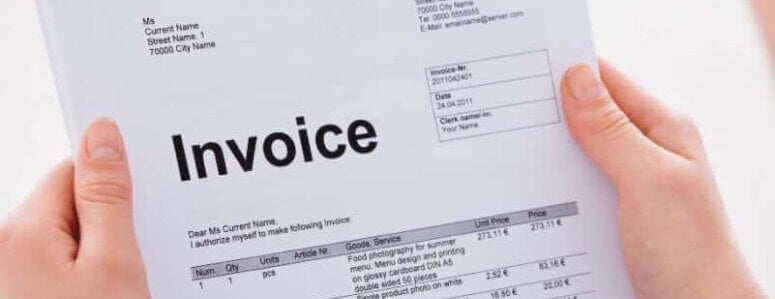
When you sign a contract with your recruitment agency or end client, it will specify how much you will be paid and how the client should be invoiced.
These days, many recruitment agencies have self-billing arrangements in place. This means that when the client has approved your timesheets, the agency automatically invoices the client on your behalf.
The details of your own limited company or umbrella (if you work through one) are automatically included on the self-billing invoice. Make sure your details are up to date, and let your agent know if anything changes.
If your agent or end client doesn’t use self-billing, you must create and submit an invoice yourself. If you’re an umbrella company contractor, the umbrella will usually raise invoices on your behalf unless a self-billing system is in place.
Our guide to timesheets and invoicing your agency or client explains more about timesheets and the invoicing process.
What to include on an invoice
Certain details must appear on any invoice you issue as a limited company contractor. If you’re VAT registered, there are additional requirements.
- The word INVOICE clearly displayed at the top.
- Invoice date.
- Unique invoice number. This must be sequential if you’re VAT registered. Even if you are not, numbering invoices helps you keep clear accounting records. Some contractors add a short client code for reference.
- Company details.
- Limited company name.
- Business name if different.
- Limited company registration number.
- VAT registration number if applicable.
- Registered address.
- Contact details such as email and phone.
- Client or agency details.
- Name and address.
- Contact name where available.
- Purchase Order or client reference number if required.
- Work details.
- Concise description of the services provided.
- Supply date for the services.
- Breakdown of units where relevant, for example, 37.5 hours @ £40 per hour.
- Your hourly or daily rate.
- Financials.
- Net total before VAT.
- VAT charged if applicable.
- Gross total.
- Bank details for electronic settlement, including sort code, account number and account name.
- Payment terms. For example, payment is due within 7, 14 or 30 days.
- Right to charge interest on late payment under the Late Payment of Commercial Debts (Interest) Act 1998.
Most of these fields are legal requirements. See the official GOV.UK guidance on invoicing and taking payment from customers.
Payment terms
Although the agency or client will usually dictate payment terms, it is good practice to include them on your invoice. Many contractors work to 7 or 14-day terms, while the default business term is 30 days.
Always make sure you have the correct contact details for the client or agency’s accounts department before submitting your invoice, and politely chase up payments that have not been received promptly.
Some invoicing tips
- Presentation matters. Although not a legal requirement, adding a logo and keeping your invoices professional can help.
- Use accounting software. Many accountants recommend FreeAgent. It makes it easy to send invoices and track payments via bank feeds. Alternatives include Xero, QuickBooks and FreshBooks.
- Basic templates. Prefer something simple? Use our very basic Word (see below).
- Online tools. You can also create instant invoices using free tools such as Zoho or Invoice Generator.
- Public sector clients. If you work directly with public sector organisations, many require electronic invoicing. Modern accounting software typically supports this.
Download a simple MS Word template
Feel free to use the limited company (VAT registered) invoice template we used here at Contract Eye in the past (before switching to online accounting). We used this exact template in the early 2000s! It’s simple, but it works.
See below for some practical online alternatives.
What happens next
Once your agency has received your timesheet and invoice, you should typically be paid by electronic transfer within 7 to 14 days, subject to your contract terms.
When you start any new contract, make sure you know who must sign off your timesheets and who to contact in the client or agency’s accounts department. Getting these details upfront could save you time and stress.
Late payments and statutory interest
If the recruitment agency or client delays payment beyond the agreed terms, you can charge statutory interest at 8% above the Bank of England base rate and add a fixed debt recovery fee, depending on the invoice amount.
See the GOV.UK guidance on late commercial payments, interest and debt recovery.
In reality, many contractors are reluctant to enforce this right, given the balance of power between contractor and agent. However, you should always include this right on your invoices.
If you do suffer late payments, read this practical advice for dealing with late-paying clients.
Other practical points
- Invoice numbering. HMRC expects invoices to be sequential with no gaps, so keep a consistent numbering system.
- Keep records. Invoices and other accounting records must be retained for at least 6 years under the Companies Act.
Our Partner Accountants
- Aardvark Accounting - Full personal service, incl. FreeAgent @ £89/month.
- Clever Accounts - Contracting experts - IR35 Flex - £104.50/month.
- SG Accounting - £59.50/month for 3 months + bespoke tax planning advice.




